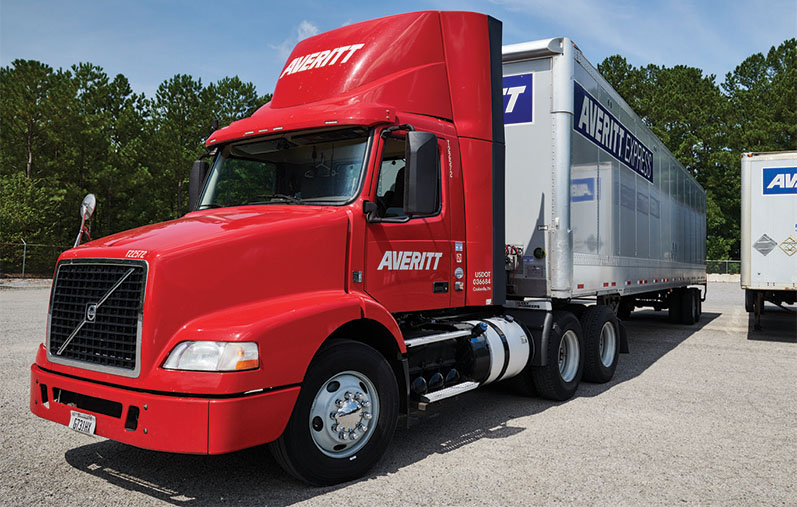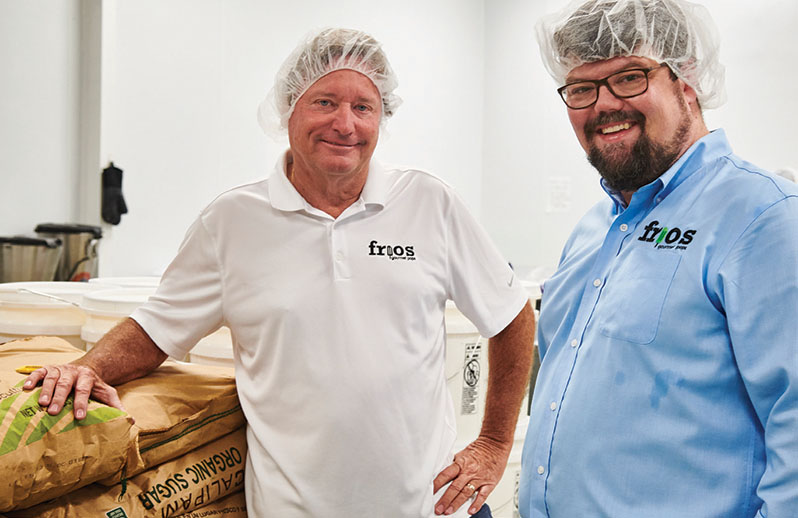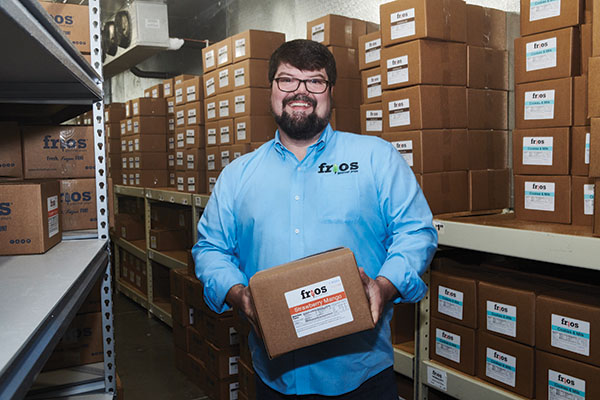Transportation Best Practices and Trends: Frios’ cool solution for a hot seller

Gourmet ice pop maker adopts collaborative cold chain solution to keep profits from melting away due to costly logistics challenges—and takes home a 2018 Alliance Award in the process.
About five years ago, Andy Harp was staring at two screens while writing computer code for his then-employer when he decided to quit and take his life
in a new direction.
Harp began thinking he could combine his love of popsicles with a new way to earn a living, and in the course of following this dream he became founder of Gadson, Ala.-based Frios Gourmet Pops, a high-end organic popsicle company. “No pun intended, but this is just what popped out of my mind,” he says.
Harp started with making popsicles in his garage and selling them out of a cart. Since then, his company has grown to where he’s now projecting sales between $2.5 million to $3 million this year to his 40 franchisees. That’s a cool—make that an ice cold—10,000 to 15,000 popsicles sold every day.
“We’re profitable and continue to add new stores nearly every day,” says Harp. “We now hope to get to 100 stores within the next 24 months.” However, he contends that none of this growth would have been possible without the development of a highly collaborative and efficient cold chain system.
 In fact, how Harp tweaked Frios’s logistics network and adopted a high-tech solution to keep his all-organic product fresh and frozen has earned Frios a 2018 Alliance Award presented by Logistics Management (LM) and SMC3. The Alliance Awards were designed to recognize how shippers and their service providers are working together to overcome challenges to critical elements of unique supply chain operations. In fact, it’s the only program in the industry that celebrates supply chain collaboration at the highest level.
In fact, how Harp tweaked Frios’s logistics network and adopted a high-tech solution to keep his all-organic product fresh and frozen has earned Frios a 2018 Alliance Award presented by Logistics Management (LM) and SMC3. The Alliance Awards were designed to recognize how shippers and their service providers are working together to overcome challenges to critical elements of unique supply chain operations. In fact, it’s the only program in the industry that celebrates supply chain collaboration at the highest level.
The Frios solution, done in conjunction with motor carrier partner Averitt and shipping container provider Cold Box, has reduced operations times for shipping by 75% while saving a cool $150,000 annually on transportation costs. Here’s how this all-American success story came to be.
The challenges
Frios Gourmet Pops says it is focused on three things: using the freshest ingredients; creating the best frozen pops possible; and bringing smiles to the faces of customers. Its corporate slogan is “Fresh, Frozen, and Fun!”
“Our flavors are as unique as our eclectic personalities, and we are passionate about our work,” says Harp. “The first day I was in business my friends and family came out to pray for me. The second day, a few folks bought pops because they felt sorry for me. Then the third day we had a line around the block, and we never looked back.”
But as the company grew, so did its logistics woes. At first Harp was using costly small package carriers to haul popsicles wrapped in dry ice, which has about a 72-hour useful life. However, Frios was growing rapidly and needed a more efficient and less expensive way to ship product to its franchises.
Due to the limitations of parcel shipping, Frios was considering building a second production facility because it was outgrowing its packing model of dry ice in coolers—and that certainly wasn’t an option for shipments from Alabama to the West Coast where Frios wanted to expand.
Having to dispose of the packing materials and return the coolers via parcel back to Frios was time consuming and frustrating for franchisees as well as ecologically unsound. Many times the coolers were not returned to Frios, so packaging was wasted.
“The issue we were having was the way we were doing ground parcel transport and packing pops in dry ice,” says Harp. “We needed a more sophisticated solution out west beyond a three-day shipping lane.”
That’s when a company called Cold Box came into the picture. Introduced to the shipping industry in 2014 as a more economical, temperature controlled pallet-sized box, Cold Box was exactly what Frios needed to extend freezing times for long-distance moves.
“It allows us to reach those western destination points by shipping in reefer containers that run off battery power,” Harp explains. “We were able to take that piece of technology and work with our LTL system, and that saves us a lot of money because we don’t have to fill an entire truck. We use what is essentially considered a frozen pallet.”

The Frios solution, done in conjunction with motor carrier partner Averitt and shipping container provider Cold Box, has reduced operations times for shipping by 75% and saved $150,000 annually on transportation costs.
How the solution works
Of course, luck sometimes helps. While Frios is located in Gadsen, Cold Box has its headquarters only 45 minutes down the road in Rainbow City, Ala. The fusion of the two ideas—Frios with organic popsicles and Cold Box with innovative temperature-controlled shipping boxes—was serendipitous.
“We were able to take that piece of technology and work with
our LTL system, and that saves us a lot of money because we
don’t have to fill an entire truck. We use what is essentially
considered a frozen pallet.”
— Andy Harp, founder, Frios Gourmet Pops
“It’s a cool piece of technology that’s allowing us to grow,” Harp says. “It was a perfect marriage for us, and it allows us the flexibility we need to ship product LTL rather than parcel.”
Foster McDonald, the CEO of Cold Box, didn’t invent the technology. It actually dates to the mid-1990s when the Con-way group of regional carriers (now part of XPO Logistics) introduced something called the “Pallet Reefer.”
McDonald partnered with the inventor (Climate Controlled Containers, Port Arthur, Texas) and bought the assets of that company in 2014. He then took that prototype and spent 18 months fine-tuning and building in more reliability and ruggedness. It can now go through crossdocking, rough transit and still work in a three-to-five day period.
“That’s our value proposition—reliable temperature control, an active container, no dry ice, battery operated, and good for three to five days,” McDonald explained.
After the Frios LTL partner Averitt Express delivers a couple cases of popsicles, the Cold Boxes stay in Averitt’s network. The empties come back to Gasden where they’re then recharged on a dedicated 110-volt, 30 amp socket. McDonald likens his product to renting a U-Haul for a move.
Cold Box has about 220 containers in circulation nationally, while Frios uses about a half dozen in transit at any given time. According to McDonald, Frios is a “one-off” customer because the unit’s highest and best use is actually in pharmaceuticals and chemicals. Along with reliability, all of the boxes have GPS and a cellular signal so that Cold Box is able to monitor each unit.

Frios Gourmet Pops CFO, Kevin Harper (left ) and Andy Harp, founder
“Frios is probably our most interesting customer in that they had a very unique requirement—running product at 5 degrees Fahrenheit in areas where the outdoor temperature can be in the 90s,” says McDonald. “Physics tells you we can only support that unit for 48 hours.”
McDonald calls Frios “great to work with because they’re so accessible,” adding that it’s a continuing education to make sure they power the units properly and recognize the temperature restraints. “It’s a work in progress, and they’ve done very well.”
Averitt’s collaborative role
Averitt Express, a major Southeastern regional and national LTL carrier, was familiar with Frios’s business potential and was also aware of the Cold Box solution. In fact, the carrier needed that solution to earn the Frios business because it operates no refrigerated trucks in its fleet of trailers.
Averitt takes control of all of the Cold Box units during all long-haul and pedal runs. “They will load boxes with Cold Boxes and make deliveries to franchisees, and then they take them back and recharge them at their facilities,” McDonald said of Averitt’s delivery personnel.
The partnership has grown to a point as to where Frios has now opened a second distribution center in Houston. With Cold Box pallets in its trucks, Averitt was now able to offer multi-stop deliveries for Frios without the worry of spoilage.
“Averitt was a great partner from the beginning,” Harp says. “Now when we’re using the Houston DC, we use a forklift right off the truck and the pops go into a storage unit, and then we bring orders in from the West Coast and use hub and spoke out of Houston.”
“It was an out-of-the-Cold-Box solution,” says Brendan Mazur, director of corporate business development at Averitt. “All the players in this collaboration are innovators. Andy and Frios had a need and we built a mousetrap to satisfy that need and bring value to the customer.”
Cold benefits
Besides saving $150,000 annually in transport costs since introducing the Averitt and Cold Box solution, Frios has had zero lost or damaged products. With the prior parcel delivery model, losses and damages were common and most prevalent in shipments to the West, averaging approximately 10% of revenue.
According to Harp, the short-term benefits for Frios included the ability to ship popsicles further in shorter amounts of time to keep franchisees stocked with fresh product. Another short-term benefit was the elimination of the need for franchisees to return coolers to Frios, moves that proved timely and costly.
Harp adds that a longer-term benefit of the relationship was the elimination of the need for Frios to open a second production facility, which saved Frios hundreds of thousands of dollars. An additional long-term benefit was the ability to support franchises all across the U.S. while still decreasing overall transportation costs.
Frios recently added franchisees in Montana and Arizona, while the Houston DC is saving Frios money, helping to keep popsicle pricing to franchisees consistent and allowing one day to two day delivery of all product.
Harp adds that his company’s growth and profitability would have been unlikely without collaboration from Cold Box and Averitt. “We started humbly and are able to grow business in a responsible way without massive amounts of debt,” he says. “Cold Box has allowed us to grow business westward without making huge investments in multiple manufacturing facilities, and Averitt was just the common carrier solution we needed to allow us to be consistent and not manage multiple production facilities.”













